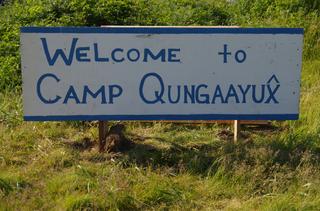Camp Funding Vanishes Amid Sequestration Cuts

Wednesday, June 05 2013
Federal budget cuts are squeezing Alaska’s culture and science camps. The Fish and Wildlife Service in Alaska has traditionally sponsored summer programs within the state’s many refuges, but with sequestration, that funding was eliminated this year, leaving some camps scrambling.
Unalaska’s Camp Qungaayux has relied on the Fish and Wildlife Service’s support for more than a decade. Last year, the federal agency contributed $15,000 outright, and $5,000 in the form of an instructor.
Tribal administrator Robin Waldron says that’s roughly 20 percent of the camp’s total budget.
“It excludes some of the classes that we’re able to offer, and we might even have to reduce the number of students that we approve because a good portion of that goes to the cost of the mentors, as well as the supplies,” Waldron says.
She's trying to avoid that by making up the lost money. Waldron has been pursuing a grant through the Aleutian Housing Authority that would provide $3,000 in matching funds, and has also planned fundraising activities. But Waldron doesn’t know if it's possible to collect the entire sum in time, so she says the tribe will also be cutting back on expenditures, like mentors from Outside.
“We’re mostly looking [for] what’s closest to home for our instructors,” Waldron says.
Fish and Wildlife Service staff have also been working on creative solutions to the funding problem. Poppy Benson coordinates the camp programs for the Alaska Maritime National Wildlife Refuge. She says that with the regional office facing a seven percent budget cut there was simply no money available for program, but she couldn’t stomach the idea of not participating at all.
“Camp is a real priority for me, all our camps are,” Benson says. “I mean, kids are the future of conservation, and it just seemed really awful that we would lose money for the camps after all these years.”
So, Benson came up with an idea to use other resources at her disposal.
“The salvation of all this was that the YCC program, which is Youth Conservation Corps, still had funding.”
Through that program, the government will hire four teenagers -- two from Unalaska, and two from Sand Point. Their supervisor will serve as a camp mentor, and the youths will be junior instructors. The whole team will participate in both the Sand Point and Unalaska camps, in the place of some of the instructors that would normally be funded by the Fish and Wildlife Service.
But other camps around the state haven’t fared as well. Three camps were canceled by the agency’s partners because of the funding cuts, and statewide seventeen camps lost a total of $200,000.




seriously? on Monday, June 10 2013:
The Unangan culture camp is important and vital to the community. The Q Tribe is a tribal GOVERNMENT, not a nonprofit. I'm sure they can find some grants to cover the shortfall.
Also, the senior party is not some lark or boondoggle -- it serves a very real purpose of protecting kids and keeping them in a safe environment. Before we had senior class parties, kids were killed in car accidents from drinking and driving, and similarly bad situations. Be grateful that we have a senior party instead of just turning kids loose.
Old Cynical Man on Saturday, June 08 2013:
When I was young in the sixties - my parents actually paid to send me to camp. THink there are enough parents on this island making money to pay for camp. Most seem to spend all their money on ridiculously big trucks , snow mobiles, and boats for themselves, so they might have a few hundred to send their kids to camp if they didn't spend it all on their own toys
Random Guy on Thursday, June 06 2013:
Try partnering with some other local agencies. The PCR has a employee dedicated to music, art and CULTURE. Just because money isn't given out anymore doesn't mean you cant do the camp; it means you'll have to work hard to find the money. Senior class this year raised tens of thousands for their senior party i'm sure the community will open up to fund this camp without the federal agencies.